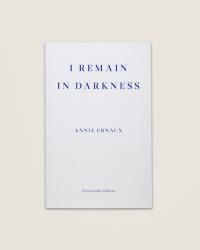
I Remain in Darkness
-
Autor: Annie Ernaux
- ISBN: 9781910695975
- EAN: 9781910695975
- Oprawa: Miękka ze skrzydełkami
- Wydawca: Fitzcarraldo
- Format: 12.6x19.6cm
- Język: angielski
- Liczba stron: 80
- Rok wydania: 2022
- Wysyłamy w ciągu: niedostępny
-
Brak ocen
-
42,98złCena detaliczna: 54,00 złNajniższa cena z ostatnich 30 dni: 42,98 zł
Artykuł chwilowo niedostępny
x
Winner of the Nobel Prize in Literature 2022
A powerful meditation on ageing and familial love, I Remain in Darkness recounts Annie Ernaux’s attempts to help her mother recover from Alzheimer’s disease, and then, when that proves futile, to bear witness to the older woman’s gradual decline and her own experience as a daughter losing a beloved parent. Haunting and devastatingly poignant, I Remain in Darkness showcases Ernaux’s unique talent for evoking life’s darkest and most bewildering episodes.
‘Acute and immediate, I Remain in Darkness is an unforgettable exploration of love, memory and the journey to loss.’
— Eimear McBride, author of A Girl Is a Half-formed Thing
‘In this work of shocking honesty and intimacy, Ernaux bears witness to her mother’s final years of living and dying with dementia. ... Sometimes the diary entries are little more than notes. They are often inconsistent, but this is part of the author’s point: the self is not coherent; an ‘I’ is full of contradictions; you can hate what you adore. The result is a meditation on the gradual loss of agency and identity. Ernaux writes of memory, of love, of loathing, of disgust, of tenderness; she writes about the frail, leaking, helpless, horrifying body, about the porous self. The narrative was always death. Writing was always an act of betrayal.'
— Nicci Gerrard, The Spectator
‘Ernaux’s mother died of Alzheimer’s disease; like John Bayley’s memoir Elegy for Iris, Ernaux’s memoir catalogues the deterioration of a once powerful, almost totemic presence, a fall so cataclysmic that it cannot be analyzed or contextualized, only reported. In I Remain in Darkness (its title taken from the last coherent sentence her mother ever wrote) Ernaux abandons her search for a larger truth because, in the face of a loss as profound as that of her mother, all attempts to make sense of it have the feel of artifice.’
— Kathryn Harrison, New York Times Book Review

